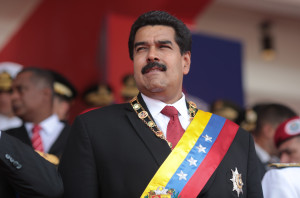Venezuelan Court Returns Legislative Powers to National Assembly
 In a rare victory of the opposition, the Venezuelan Supreme Court ruled on April 1 to revise parts of its decision that divested the National Assembly of its legislative powers.
In a rare victory of the opposition, the Venezuelan Supreme Court ruled on April 1 to revise parts of its decision that divested the National Assembly of its legislative powers.
The dramatic reversal of the March 30 ruling that ignited domestic and international outrage seems to have de-escalated a major political crisis. However, there are few signs that this reversal will diffuse tensions among Venezuelan President Nicolas Maduro’s government and the opposition, and it is likely that political repression and the opposition’s backlash will only grow stronger.
The emergence of the deep rift among the governmental branches can be traced back to 2015, when rising discontent with Maduro’s administration and the faltering economy led the opposition to win control of the legislature. At the time, Maduro publicly accepted the vote, but as instability in the country grew and Maduro consolidated his executive strength, the Supreme Court continuously eroded the Assembly’s powers.
The Supreme Court, packed with loyalists and largely believed to be under Maduro’s control, has consistently blocked congressional measures by overturning several laws as unconstitutional, refusing to let the Assembly seat lawmakers on the grounds of voting irregularities, and siding with the president in numerous cases of executive overreach.
Meanwhile, Maduro has moved his country closer and closer to authoritarianism. According to the Penal Forum, a Venezuelan Human Rights group, there are now up to 114 political prisoners detained. The president has heightened security measures in the past few months, assigning Vice President Tareck el Aissami to head the new “anti-coup command,” designed to root out subversives. The opposition is frequently silenced, local elections postponed, protesters brutally repressed, and press freedoms limited.
The Supreme Court ruling on March 30 nullified the existing legislature. The loyalist court assumed parliamentary powers for itself, claiming the National Assembly to be in contempt and effectively removing what many believed was the last check to Maduro’s government. Widely denounced as a move from an authoritarian government to an outright dictatorship, the decision received heavy criticism by members of the National Assembly and the international community.
The March 28 meeting of the Organization of American States (OAS) was called to consider the expulsion of Venezuela from the group for violating the organization’s democratic order. The meeting ended without a vote, but the ruling, as the clearest sign thus far of the democratic erosion, galvanized the already-rampant condemnation by the international community. In response to the court’s decision, Peru recalled its ambassador to Venezuela. The President of the National Assembly, Julio Borges, declared the assembly “in rebellion,” and Luis Almagro, the secretary general of the OAS, called the decision a “self-inflicted coup.”
The ruling has also highlighted dissent among Maduro’s own supporters, most notably Attorney General Luisa Ortega, who called it illegal and described it as a “rupture in the constitutional order.” The high-level confrontation between a Maduro supporter and his administration signals further divisions within the Socialist Party.
Pressured by widespread criticism, Maduro appeared on television on March 31 after emergency talks with his security staff, asking the court to review its decision. He has since invited the opposition to the negotiating table.
As the court still considers the National Assembly to be in contempt of the law, it is unclear how far they will go to restore the legislature’s powers. Given the protracted conflict between the two branches of government over the last few years, it is likely that tensions between loyalists and the opposition will only intensify.
The opposition has not shown signs that they take this reversal as a restoration of democratic processes in the country. On the contrary, they have responded to Maduro’s calls to negotiation by demanding that the government comply with their longtime request to move the presidential election forward. “The only possible dialogue is the vote,” declared Julio Borges, President of the National Assembly. The opposition has declared that they will move to remove members of the loyalist Supreme Court.
Thousands of Venezuelans, including several lawmakers, protested in the streets on April 1 to demonstrate support for the National Assembly. Despite Venezuela’s massive oil reserves, years of economic mismanagement and the falling price of oil have plunged the country into its worst economic recession in recent history. The government’s popularity has drastically declined due to food and medicine shortages, triple digit inflation, and rampant street crime. In a show of popular dissent, hundreds of thousands of Venezuelans took to the streets in October, demanding a referendum to oust the president. Despite the clear permission of such a referendum in the country’s constitution and its obvious popularity, Maduro claimed that it was an illegal attempt by his opponents to stage a coup. On the grounds of signature-gathering irregularities, a lower court suspended the process in October.
With mounting pressure from the international community to solve Venezuela’s immediate problems, the Maduro administration is now struggling to reconcile the ambitions of its leader with the plain and absolute failure of the country’s institutions. Venezuela serves as an example of the dangers of populism carried out to its logical conclusion.
